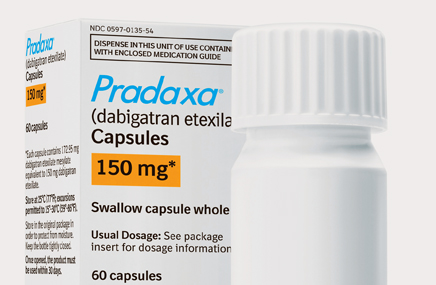Boehringer Ingelheim, on the defense about the anticoagulant Pradaxa for some time over bleeding concerns, went on the offensive this week, reporting results from studies that the drugmaker says corroborate the safety of the blockbuster anticoagulant.
The data on Pradaxa (dabigatran), released during the American Heart Association’s conference in Chicago this week, include two database analyses on the drug’s benefit-risk profile in patients with non-valvular atrial fibrillation. One of the database analyses was conducted in conjunction with Harvard-affiliated Brigham and Women’s Hospital and the other with the US Department of Defense.
Also released was a progress update on the blood thinner’s Phase-III reversal agent, idarucizumab.
The DOD analysis showed that patients taking Pradaxa were less likely to have a stroke and major bleeding issues compared to those taking warfarin, but the Pradaxa group experienced more incidents of risk for lower gastrointestinal bleeding.
Brigham and Women’s Hospital’s study observed that Pradaxa patients also had fewer strokes, but exhibited fewer major bleeding events in all areas compared to warfarin patients.Brigham and Women’s Hospital evaluated 38,378 patients in two health insurance databases; DOD analyzed 25,586 patients from a Military Health System database.
This real-world setting data showed similar results to a recent FDA-conducted analysis published in Circulation, but are at odds with another smaller study published in JAMA Internal Medicine. FDA, too, found no difference in major bleeding episodes between Pradaxa and warfarin. JAMA Internal Medicine’s, “Dabigatran Associated with Higher Incidence of Major Bleeding vs. Warfarin,” however, posited that Pradaxa “appears to be associated with a higher incidence of major bleeding (regardless of the anatomical site). Thus, dabigatran should be prescribed with caution, especially among high-risk patients.”
BI also announced interim data from a Phase-I sub analysis of idarucizumab, which it says reversed Pradaxa’s anticoagulant effects. The antidote is currently being tested in a Phase-III global study. FDA granted idarucizumab Breakthrough Therapy designation in June of this year.
This news comes in the wake of BI’s decision to settle 4,000 cases involving the blood thinner for $650 million in May. Public court documents—reported on by The New York Times earlier this year—showed, via internal e-mails, that BI employees fretted about the publication of a research paper. The paper suggested some patients on Pradaxa should have routine blood tests— the absence of which were thought to be one of the drug’s major competitive advantages over warfarin.
Thomas J. Moore, a senior scientist for the Institute for Safe Medication Practices, said at the time, “The one-size-fits-all was a mistake for a drug with this kind of risk,” and noted that Pradaxa had been cited in more than 1,000 deaths reported to the agency through 2012. Nine million prescriptions for Pradaxa have been filed, according to BI. Pradaxa brought in $1.5 billion in global sales for fiscal year 2013, with sales growing by 16% compared to the year-ago period.








